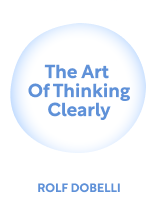

This article is an excerpt from the Shortform book guide to "The Art of Thinking Clearly" by Rolf Dobelli. Shortform has the world's best summaries and analyses of books you should be reading.
Like this article? Sign up for a free trial here .
Why is group membership so important? Where does the human need to belong stem from?
One of the evolutionary traits that most influences you is the desire to be in a group. For early humans, group membership was necessary for survival. Those who left the group died, while those who stuck to the status quo survived and reproduced. Thus, your brain is genetically wired to fit in. Although the human need to belong has evolutionary value, it causes some fallacies in the way we interpret other people’s behavior.
Let’s explore some fallacies resulting from our need to belong.
Social Proof
Social proof is an example of group instinct. To fit in, you copy other people’s behavior and judge that behavior according to the number of people participating in it. The more people participating, the “better” you judge the action, Dobelli says. This effect influences you at all times.
(Shortform note: While Dobelli describes social proof as constantly influencing you, others argue that it only works when you’re uncertain: If you know what to do, you don’t need other people’s guidance.)
This tendency was helpful in the past as it aided survival: If everyone else was building shelters and looking for firewood, you knew bad weather was coming and could prepare, Dobelli says. If everyone else ran away, you ran too because there was probably a predator nearby.
In modern times, though, your decisions don’t always fall into the dichotomy of “follow the group and live” or “leave the group and die,” Dobelli adds. Modern humans have more physical security, so decisions revolve around more nuanced issues like being happy. In these instances, following the group can lead you astray. For example, if everyone else pursues an office career, your brain assumes it’s safer and wants to do the same, no matter how miserable such a job might make you.
(Shortform note: As Dobelli notes, most people aren’t faced with the live-or-die dichotomy today, yet social proof and its negative consequences persist. Why? In the absence of external threats, your brain sees rejection as a danger. This fear of rejection leads you to people-please, hide your personality, and try to fit in by following the group.)
Reciprocity
According to Dobelli, reciprocity is another tendency that forms out of humanity’s need to belong to a group: If someone does something for you, you’re more likely to do something for them in return. This comes from a dislike of being in other people’s debt.
(Shortform note: How specifically you react to being in someone’s debt depends on your reciprocity style: You either only help others when it benefits you, and so are less affected by being in debt; help others for the sake of helping even when it means a loss for yourself, and so are highly affected by being in debt; or help others to the same extent they help you, where you have a more neutral reaction to being in debt.)
Reciprocity is a vital part of life, Dobelli notes. It inspires cooperation, creates and strengthens communities, and helps keep the group healthy. (Shortform note: Mutual aid is a form of reciprocity that inspires these factors. Communities unite to support the group, everyone helping and being helped in turn. Poor and marginalized groups have used mutual aid throughout history, and researchers have even observed the phenomenon in animals, pointing to reciprocity’s evolutionary origins.)
Unfortunately, Dobelli concedes, this tendency can be twisted. Manipulating people into giving you something is easy if you first make them feel indebted to you. (Shortform note: Often, manipulative people offer you some small benefit before asking for a larger favor. Even though the exchange is imbalanced, you still feel compelled to agree.)
Reciprocity also has a dark side: retaliation. Dobelli points out that when others are kind to you, you want to return the favor and be nice as well, but if someone hurts you, you want to hurt them in return. This cycle only escalates the problem.
(Shortform note: Though Dobelli argues that retaliation is dangerous, others argue that retaliation—or negative reciprocity—is a necessary part of cooperation. They clarify that Dobelli refers to private retaliation, where an injured party carries out retaliation without supervision and frequently over-retaliates, prompting the initial aggressor to retaliate in turn. However, public retaliation is the basis of the legal system: A proportionate form of retaliation is objectively determined and taken against the initial aggressor. Given this definition, retaliation is an important part of society, so long as it’s objectively proportionate.)
Authority Bias
Authority bias is another fallacy related to social proof, Dobelli says. However, rather than being pressured by a group, you’re pressured by an authority. An authority is anyone with power over you, whether through knowledge (they’re more knowledgeable than you) or political or social power. (Shortform note: This authority doesn’t have to be applicable to the situation. As long as you view the person as an authority in one field (say, a politician being an authority in government), you’ll listen to their advice or opinions in other fields too (such as medicine). This is because you attribute their authority to them as a person rather than to their field of expertise.)
Authority bias convinces you to act in ways you otherwise wouldn’t through respect or fear, Dobelli explains. You assume that the authority must be right because of their position of power, or you’re afraid to disobey them because of that power. (Shortform note: In addition, you’re trained throughout your life to obey authorities. You form a “heuristic,” or a shortcut in thinking: When an order is given by an authority, your brain automatically accepts it.)
To overcome authority bias, Dobelli suggests asking yourself how authorities are influencing you and if you should let them continue to do so.
The Nonsense Distraction
The next bias we’ll discuss is what Dobelli calls the “twaddle tendency”—or, as we’ll call it for simplicity, the nonsense distraction. Dobelli notes that people distract from their ignorance, uncertainty, or laziness by speaking long-winded nonsense. This is an attempt to maintain group membership: Part of group membership is bringing some level of knowledge to the group. When people feel their membership is threatened, they pretend to have knowledge to protect their position in the group.
(Shortform note: Another word for nonsense is “pseudo-profound bullshit”: saying things that sound profound but are really meaningless. The goal isn’t to educate but to disguise ignorance and to maintain verisimilitude. People do this because of a lack of self-worth: If they were confident in their self-worth, they’d feel secure enough to reveal their ignorance and learn from others.)
Anyone who’s watched a political debate has witnessed the nonsense distraction. A politician gives a rambling answer with lots of patriotic keywords, and you realize they didn’t really answer the question.
Avoid this tendency by testing your ideas for logic and clarity, Dobelli advises. If you don’t know something, it’s better to admit you don’t know than to hide your ignorance.
(Shortform note: It’s not always better to show your ignorance as Dobelli suggests. If you’re in a position of authority, doing so may harm your credibility. Continuing our example, voters are more likely to dismiss a politician who admits ignorance than one who disguises their ignorance. Logically, the voters might know the honest answer is better, but the nonsense distraction makes them prefer a useless answer to none.)
Fundamental Attribution Error
Another fallacy related to group membership is the fundamental attribution error. According to Dobelli, people ignore outside influences on problematic situations, instead assigning blame for the problem to the most visible individual. This is because your brain is designed to pay attention to the people around you—in other words, your present “group.”
(Shortform note: The fundamental attribution error also relates to collectivist and individualist cultures, as discussed above. Individualist cultures place high emphasis on individual identity, so members of these cultures naturally fall prey to the fundamental attribution error more than their collectivist counterparts, who place greater emphasis on the group and the circumstances.)
In-Group, Out-Group Bias
Part of humanity’s desire to be in a group is prioritizing your own group above others. As Dobelli explains, this means you magnify your group’s positive traits and minimize those of other groups: a phenomenon called in-group, out-group bias. (Shortform note: Why do you prioritize your in-group? Dobelli doesn’t say, but others suggest that by categorizing yourself as a member of a group, you make that membership part of your identity and thus focus on its positive traits. In-group bias is stronger in people with low self-esteem, who rely more heavily on their group for a positive sense of identity.)
Dobelli notes that there are three components to believing your group is better than others:
1. Groups frequently form around unimportant things, but your brain locks onto those similarities and prioritizes them above any differences. (Shortform note: These prioritized in-groups can change depending on the situation. If you’re driving and a pedestrian blocks the road, you’ll be annoyed at pedestrians. Your in-group is “drivers,” while “pedestrians” is an out-group. However, if you’re later a pedestrian and a car honks at you, you’ll be annoyed at drivers. Your in-group shifted to “pedestrians” according to the situation, and your feelings likewise shifted.)
2. When you’re in a group, your brain views the members of other groups as more similar than they are. Your brain wants others to fit neatly into their opposing box, so it ignores any conflicting information. (Shortform note: Research confirms that people can identify minor differences between in-group faces while missing differences between out-group faces. Your brain recognizes when individuals aren’t in your in-group and puts less effort into processing or remembering their faces, meaning it doesn’t register differences between these faces.)
3. Groups usually form around people’s opinions, which means you spend a lot of time with other people who hold the same opinions as you. Because everyone around you agrees, you believe your group must be right. (Shortform note: On social media, this kind of group is called an echo chamber. Social media algorithms direct you to people with similar beliefs, which reinforces your underlying beliefs. In turn, interacting with those people reinforces the algorithm.)
In the modern day, Dobelli argues, group bias is a dangerous phenomenon that blinds you to the facts of a situation and enforces prejudice. (Shortform note: To counter this bias, spend time with members of out-groups. Focus on points of connection, rather than differences, and recognize when your groups are formed around arbitrary means.)
Social Comparison Bias
Another fallacy that forms from group membership is social comparison bias, Dobelli explains. This involves refusing to help someone out of fear that they’ll take your spot in the group. This is a defense mechanism: You don’t want to lose your position in the group, so you won’t help others even if doing so would help the group.
Social comparison bias is especially prevalent in the business world, Dobelli says. People hire below their own skill level so they don’t feel threatened. By hiring less qualified people, however, you ensure your business won’t excel: It’ll be limited by your abilities and the lesser abilities of your employees. Instead, improve your company by hiring the best, even if they’re better than you.
(Shortform note: A barrier to hiring the best people might be worry about how to manage people who are smarter than you. In this situation, focus on what you bring to the team and how to create an environment where your employees can best use their expertise. In addition, acknowledge the areas in which you fall short and learn from your more experienced employees.)
Social Loafing
When added to a group, individuals lessen the effort they exert, both physically and mentally. This allows them to save energy—this is social loafing. Dobelli says this is a feature of groups, not a bug: Early humans formed groups because the responsibility for survival was spread out rather than concentrated on each individual.
When a member puts too little effort into the group’s actions, however, they are looked down upon and sometimes expelled from the group. Thus, Dobelli notes, social loafing is a careful balancing act, with each team member putting in enough effort that their slacking isn’t noticed.
While social loafing is a rational behavior on the part of the worker, it’s a problem for employers, Dobelli argues. Social loafing means teams are more willing to take bigger risks than the individuals that compose them. They do so because the shared responsibility involved in group membership means they won’t be the sole focus of the blame if things go wrong.
(Shortform note: Interestingly, most definitions of social loafing don’t include the idea that groups make riskier decisions than individuals. This is considered a separate phenomenon called “risky shift.” However, Dobelli’s inclusion of risky shift as an element of social loafing makes sense, as diffused responsibility is the cause of both phenomena.)
The best way to combat social loafing is to make sure that the group can trace everyone’s individual contributions back to them. This increases personal responsibility and requires all the team members to put their full effort forward, Dobelli says. (Shortform note: You can also manipulate in-group bias, discussed above, to avoid this fallacy. When people feel a sense of kinship with their group, they’ll work harder to benefit said group.)

———End of Preview———
Like what you just read? Read the rest of the world's best book summary and analysis of Rolf Dobelli's "The Art of Thinking Clearly" at Shortform .
Here's what you'll find in our full The Art of Thinking Clearly summary :
- A detailed look at the most common logical fallacies that inhibit decision-making
- How to recognize and overcome these fallacies to make better decisions
- Why you value things for arbitrary reasons






